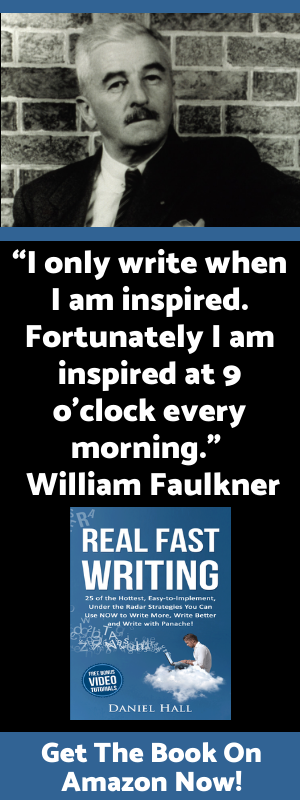Turbo-Charge Your Content Production & Crush Your Procrastination With This Simple 5 Step Formula With Rita Emmett

Welcome to our next installment of Real Fast Results. I am so pleased that you are with us. And boy, do we have a great episode for you today. I have another one of my good friends, that is Rita Emmett, in the house. We’re going to be chatting about something that I know will be beneficial to most, if not all of you. Probably you, the person listening right now. What we’re going to cover today is going to be very helpful to you. Today we are discussing how to go about turbo charging your content production efforts. In other words, if you are writing, writing books, creating videos, creating podcasts–whatever it is that you’re doing to create content, we’re going to show you some ways to actually speed that process along and get more done in less time. You’re going to do this by essentially crushing the tendencies that we all have, myself included, to procrastinate. Putting off those things that we need to really do and focus on, but for one reason or another, we don’t. Rita is an absolute master at crushing these sorts of tendencies, especially from the writer’s standpoint.
A Recovering Procrastinator – Rita Emmett
With me, I was the world’s greatest procrastinator. I believed with all my heart that it was the way I was born. It was a personality flaw; it was a character trait; it’s just how I am. As a result, even as a teenager when everybody talked about dreams, I didn’t have dreams because I knew I wouldn’t achieve them. I didn’t think I’d ever travel because I knew I could never be on a plane. There was a hopelessness. There was an underlying hopelessness that I’m never going to get anything done. I believed that and therefore, I didn’t try. I didn’t volunteer, because I wouldn’t follow through. I didn’t even have goals. Then I realized it’s a habit.
I was asked to teach a time management class. I read a couple of time management books. Took a couple of seminars  and I’m teaching it. This was back at a Continuing Ed class at a college when people took eight-week classes. People kept saying, “Are there any good books on time management?” You’re going to love this. I used to pray to God to please have somebody write a good book on time management. No, on procrastination. There were books on time management but nothing on procrastination.
and I’m teaching it. This was back at a Continuing Ed class at a college when people took eight-week classes. People kept saying, “Are there any good books on time management?” You’re going to love this. I used to pray to God to please have somebody write a good book on time management. No, on procrastination. There were books on time management but nothing on procrastination.
Because it was an eight-week class, I had the luxury of saying, “Go home and try this.” They’d come back and they’d say, “Well, that did not work” or “That worked.” After a couple of eight-week sessions over and over, I had stuff that worked. I was praying that somebody would write a good book on procrastination because all that was out there was by psychologists for psychologists. Then I had one of those smack yourself in the head moments that said, “Rita, write the book.”
I wrote the book and asked the publisher could we make it a paperback? They said, “You’re going to lose a lot of profits a lot of royalties.” I said, “A lot of people can’t afford a $30 book but most people can afford a 13, 14 or 15 bucks.” I thought I was going to sell it in the back of the room and I figured, “Wow, what if I sold about 500 in the year? That would be so exciting.” It sold 100,000 the first year! So, other people were wishing there was a new book on procrastination. One of the things for authors is if you wished there was something out there to achieve or help something, other people are wishing it, too. You may as well write it.
I ended up on the Today Show having a best-selling book. Procrastinator’s Handbook followed by The Clutter-Busting Handbook followed by Manage Your Time to Reduce Your Stress.
Procrastination Strategy – STING
Let’s go through the process that helps people break through their procrastination and get some production out quickly. It’s a strategy to help take the sting out of those times when you feel overwhelmed. Those times when you say, “I have so much to do. I don’t know where to start. I have so much to do, I can’t do it all.” I think feeling overwhelmed is an underlying cause of procrastination. I also think that overwhelmed feeling sucks the energy out of the marrow of our bones. Have you ever said, “I’m going to really attack the clutter in the garage or in my office?” You walk in and you look at it and you think, “Oh, I need a nap.” It’s exhausting.
To take the “sting” out of feeling overwhelmed is a five-step process where the first letters of each tactic spells STING.
S – Select One Task
The first one is: Select – Select one place to start. We like to start with everything but that doesn’t work. Select one area you want to start in. I want to outline a book or I want to learn a little bit about starting my own business or I want to find some tips on how to meet people and have friendships; whatever it is.
A great example is our son and his wife could not afford going to Ireland. They said, “we will go in two years.” They spent two years saving and budgeting and having the kids do research. We were all going together and the kids got to pick the sites. When we got there, all four of them were teenagers at that point, they weren’t bored because they got to pick where we went. However, they had to sell the others on it so it couldn’t be a weird place. Wherever we went, they were invested. They were interested. It was a dream come true. But at first, it was overwhelming at first. “We can’t afford it. We don’t know where we want to go.” You just select one place to start.
 T – Time It
T – Time It
The T of STING is time it. Decide on one thing. “I’m going to spend an hour on this.” I keep a timer at my desk. Or you can use your phone or a computer timer. Usually, the best thing is to decide to spend one hour on what you’re going to do. That way you might say, “Oh, I don’t want to spend the whole weekend cleaning out the garage.” Don’t. Spend an hour. “I don’t want to spend the whole evening working on my bills and my paperwork and the checkbook because I’m tired.” Don’t. Just an hour. A lot of procrastinators don’t have a sense of how long something takes. They really do think that this job takes the whole Saturday or a whole evening and they find out it took 27 minutes. They might think, “Oh, man. I’ve been letting that bug me and bug me and bug me for all this time.”
I – Ignore Everything Else
The S is select one thing to do. The T is time it. Now in that hour, there are two rules. That’s the I and the N of STING. The I is ignore everything else. Have you ever started something, where you say, “I’m going to make that call. I’m going to look up the phone number. Oh, while I’m looking up that phone number, I see that here is a bill that has to be paid. Oh, as long as I’m paying the bill, I should pay some other bills. Oh, I’d better make sure the checkbook balances.” At the end of the day, you’ve got 15 things started, none of them finished and you say, “Well, I was multi-tasking.” It’s not not multi-tasking if you didn’t get it done. In that hour, ignore everything else. Ignore phone calls. If they were calling you when you were in a doctor’s office or in an important meeting or in church, you wouldn’t answer it. Ignore phone calls and texts and anything that can interrupt you. Just give an hour to that job.
N – No Breaks
The N of STING is no breaks. I used to be able to take a three-hour job and have it last eight months because I was so good at taking breaks. I would have the pause that refreshes. No breaks. If you ignore everything else and there are no breaks, you are doing pure work. Before we came up with this in that class, I hardly ever did pure work. I remember as a kid saying, “I studied and studied and studied this and I flunked the test anyway.” I look back and I was a twirling kid. I would stand in my room and twirl. I don’t know why but I would stand in my room and just twirl and twirl and never open a book. However, I believed I spent the whole evening studying. I think that’s what we do. We think that this is going to take forever because the last time, it did. It only took forever because we didn’t ignore everything else. And, we did take breaks.
 G – Give Yourself a Reward
G – Give Yourself a Reward
So we’ve got select. Time it. One thing to do is time it. Give it a half hour; give it an hour, not much more. At the end of an hour … Okay, ignore everything else and no breaks. At the end, the last G of STING is give yourself a reward. There is a lot to this. First of all, it’s not get a reward. Oh, yes, a trip to Hawaii would be lovely for clearing the clutter off your desk. It’s what can you give yourself. The other thing is I think a lot of people say, “Well, other people need a reward, but I don’t.” It’s an essential part of the strategy. Over and over I get emails that say, “How can I start to like a job that I hate?” I don’t know. I do know that if there is a reward at the end of that job and you’ll do anything to get that reward, you’ll do the work you hate. Get it over with and enjoy the reward.
What can we use as rewards? A big one is things that you could get anyway and you’re not going to let yourself have. I’ll give you an example. I used to walk 2 and a half miles a day. I had to go a year without it because of a cardiology thing. Now I’m back, and it’s hard to get myself walking. I loved it before but now, all of a sudden, I’m at the end of the day and I forgot. I forgot to walk. I thought, “I know what I’m going to do. I’m not going to let myself have coffee until I go for that walk.” I’m up to a mile. I’m not doing 2 and a half miles yet. I will do anything for that coffee. That’s just perfect for me. Could I have the coffee anyway? I feel like, “Don’t talk to me. I haven’t had my coffee yet. I don’t want to talk.” What happens is that you don’t start to love the job but you start to achieve tasks. You get yourself into a rhythm of get it done; do the work; and then get a reward.
Another place to get rewards: Back when I started talking about procrastination, about 18 years ago, people put off what they hate to do. Now they still put off what they hate to do. However, a lot of people put off what they love to do. Over and over, I hear people say, “Oh, I love to read novels and westerns and mysteries but I’ve got so much professional stuff to read, I don’t have time to read anymore. Or I love to go to the movies but pretty much we stay home and watch TV but you know, when you’re watching a comedy, it’s so much fun in the movies when everybody’s all laughing at once. Or I love concerts or I love museums or I love this or that; being outdoors. I love being out in the fresh air but there’s no time.” That can become a reward.
Example
A dad told me a very cool story. He has moved his office home and he has three little guys. The oldest is in first grade. He taught them that when the timer is ticking, if you don’t interrupt me, then when it dings, I’ll give you all the attention you need. The 6-year-old was teaching the 2 little ones about numbers and times and everything. He gathered the family together and said, “I was working on a project that I thought would take me months and months but because you guys honored that timer, I got it done in five weeks. I’m giving myself a reward. I’m going to go to the zoo. Who wants to go to the zoo with me?” Well, of course the three boys did. The mom said, “Oh, no, dear. You go ahead.” She gets a day off. I thought what a message to the kids. Number one, work first, then reward. Number two, my dad wanted a reward and I’m part of it. What does that do to a kid’s self-esteem? A really odd thing that happens is a lot of cases, you’re rewarding for doing something … Sometimes that something becomes a reward. For example, my guess is that within a few months if I go without walking, I’ll miss it and that will become my reward to do something else.
I just got an email from a woman who said, “Clutter-busting for her was such a horrible, horrible ordeal.” She said, “Now our house is clutter-free.” It took her about 14 months. She had a big deal to work with. Now her house is clutter-free. When she finds herself stressed out and agitated, she goes clutter-busting with paper clutter or goes through a closet because it’s bringing order to chaos. There is something very satisfying. I said, “Do you remember you had to use a reward to get yourself to clutter-bust?” She said, “I know. Now I clutter-bust as a reward to get something else done.” Writing a book and starting a business is a great example. Somebody has been putting it off; putting it off and they have to use a reward to force them to do that one hour of outlining, for example. Then all of a sudden, six months into it, that’s the reward. Okay, if I can get the house cleaned or if I can get this paper clutter done, then I can put in 2 hours of writing.
A lot of people find that they have to force themselves and push themselves to start clutter-busting. When you start going through your clutter, a couple of things happen. One, is you hold something and say, “I have no idea why I’m keeping this.” The other thing that happens is that you say, “Wow. I forgot l had this. This is so cool. I feel like I just went on a shopping spree. This is great.” You’re right. You start to enjoy the progress.
Recap – STING
People ask why do I say I’m a recovering procrastinator? I was a procrastinator. I converted. Now I’m a recovering procrastinator. Why don’t I say I don’t have procrastination tendencies? I find myself sometimes leaning towards putting off something. The next question is, “What do you do?” I do these five steps (STING). These five steps, I still use them. I still say, “Okay, I’m just going to tackle this part of the job, not the whole job.” I tell people not the whole job. If you’re clutter-busting, not the whole closet, just the shelf. Not the whole car, just the back seat. Not the whole office, just that corner over there or that shelf on the bookcase. That’s where I’m at now.
S-T-I-N-G
- S – select one task
- T – time yourself
- I – ignore everything else
- N – no breaks
- G – give yourself a reward at the end.
The reward may be the hardest part. A lot of us are so focused on taking care of everyone else, it’s very hard to think of what would make a good reward for ourselves. A lot of times, when you start to make a list of what would be a good reward, you realize almost all of it is free: spending time with a friend, spending time with family, going out in nature. A lot of it, there is no cost.
What if STING isn’t working?
 If you find that you’re still procrastinating about something and that STING isn’t working, then it’s fear. 100% of the time, it’s fear. It’s self-talk that creates the fear. If somebody else is putting us down about our goal and they say, “Oh, Daniel, you’ll never get that book written” or “Oh, you’ll start that exercise class and you’ll never follow up” or “You’re never going to do anything.” A lot of times we feel so ticked off that we say, “I didn’t plan on doing it but now I’m going to do it just to show you.” If it’s the voice inside us saying, “I don’t think I can do that. I’ll never get it done. I’ll start it and I’ll stop it,” that voice voicing those fears has the power to immobilize us. Simply by identifying and naming what your afraid of, often takes its power away.
If you find that you’re still procrastinating about something and that STING isn’t working, then it’s fear. 100% of the time, it’s fear. It’s self-talk that creates the fear. If somebody else is putting us down about our goal and they say, “Oh, Daniel, you’ll never get that book written” or “Oh, you’ll start that exercise class and you’ll never follow up” or “You’re never going to do anything.” A lot of times we feel so ticked off that we say, “I didn’t plan on doing it but now I’m going to do it just to show you.” If it’s the voice inside us saying, “I don’t think I can do that. I’ll never get it done. I’ll start it and I’ll stop it,” that voice voicing those fears has the power to immobilize us. Simply by identifying and naming what your afraid of, often takes its power away.
When somebody is putting something off, they need to pay attention to am I afraid if I write a book, people will know me? Am I afraid of rejection? Am I afraid of starting it and not being able to finish it? That used to be a fear of mine. Everybody understands fear of failure. But not a lot of people understand fear of success. That is very big and it’s insidious, but it’s prevalent. It’s out there. Fear of success might be, “Well, I’d be the only one in my family finishing college or starting a business and they’d think I’m snooty or my friends might not hang out with me.” Or “I’ve got enough responsibility on my shoulders. Will that involve more responsibility?” Or “How will my life change? I don’t think rich people are good. I’ve always heard that they’re terrible. In our family, we think rich people are bad, so maybe I don’t want to be rich.” Just a lot of self-talk.
Example
I just recently was talking to a fellow who had been struggling and I asked, “Can you identify what you’re afraid of?” He talked a little bit. You have to almost go what if. “Well, I’m afraid that I might finish the book and then I’d have to get an agent.” “Well, what if you got an agent?” “Well, I’m afraid that I’d be rejected.” It came out to be rejection. Once he had identified it, not only did it lose its power but his attitude was, “I’m not going to let fear of rejection run my life.” “I think it’s been there my whole life,” he said, “and I’m not going to let it happen.”
Recently, a woman told about going all day and not calling the neighbor about the neighbor’s son passing away. I said. “What are you afraid of?” She said, “Oh, I don’t think I’m afraid of anything.” I said, “Well, what do you think is holding you back from making the call?” She said, “Yeah, it’s fear,” because she could feel it in your stomach. I said, “What are you afraid of?” She said, “Thinking about it, it comes down to I’m afraid of saying something bad; saying the wrong thing.” I said to her, “Do you really think there is anything you could say; any right thing that could take the pain away?” She said, “No.” I said, “Think about it.” So she thought about it and she realized even if she didn’t say anything, just being there would mean a lot. It made it very easy to make the phone call.
Perfectionism
We didn’t talk about perfectionism. A woman said to me once her house was a mess. We were in a group and I was thinking, yeah, back when I was a procrastinator, my house was a mess. She said, “My house is a mess because I’m a perfectionist.” The guy sitting next to her said, “I think that sounds backwards. I would think it would be perfect.” She said, “No, no. My mother taught me the right way to wash the kitchen floors. You move everything out. You wash the floor and then you move everything back. The same way with vacuuming.” She said, “If I don’t have the time or the energy to do it perfectly, I don’t do it at all.” I think one of the fears is being not perfect. I’m afraid that I don’t have the perfect thing to say or the time or the energy to do something perfectly. There’s a writer, Michael LeBoeuf, who wrote a business book and in there, he said, “Done is better than perfect.”
Daniel’s Real Fast Result Tips: Procrastination
- When you set your timer for an hour, you may find you are building momentum and don’t want to stop after an hour. So, keep on going!
- Whatever is stopping you from acting – make a conscious decision to step around it.
Resources
 Books by Rita:
Books by Rita:
Procrastinator’s Handbook
The Clutter-Busting Handbook
Manage Your Time to Reduce Your Stress
Rita’s “Anticrastination Tip Sheet”
Michael LeBoeuf – The Perfect Business
Course by Rita and Daniel – Procrastinator’s Guide to Authorship – http://helpwritingbook.com/
Filed in: Cool Tools • Digital Publishing • ebooks • Get More Done • Podcast • Time Management










Comments (1)
Trackback URL | Comments RSS Feed
Sites That Link to this Post